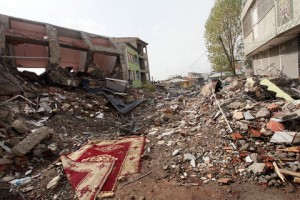10 Nov BE FINANCIALLY PREPARED IN ANY EVENT
How can you prepare, financially, for the uncertainties?
Wildfires, hurricanes, terrorist attacks, floods, earthquakes … there are many disasters, both man-made and natural, that could happen without warning. For many, preparedness is a way of life. If you’ve lived all your life on a fault line, for example, then making your home and belongings earthquake-ready may be a no-brainer. But are you totally prepared? Are you financially prepared?
You’ll need more than nails and two-by-fours … it’s hard to “board up” something that you can’t physically see or touch. For most of us, our “net worth” is simply a number and not a “Fort Knox” of dollar bills and coins stashed in our basement. So, how do you protect what you can’t see? While I can’t possibly cover every angle of disaster preparedness in this article, the following constitutes a good starting point …
Your job. It’s important to find out how your job could be affected in the event of a disaster. If we look at those affected by Hurricane Katrina, for example, in many cases they had no job to return to … even if they could. Find out now if your employer has a disaster plan, and what that plan is. If the company shuts down, will you be able to collect unemployment compensation? If the shut-down is temporary, will you continue to collect a paycheck? If not, can you use sick time or vacation time in the interim? The answers to these questions can vary from employer to employer, so find out now what YOUR employer’s policies are. The more you know in advance, the better you can prepare.
Your cash flow. Even if you consider yourself to be very wealthy, you could still experience serious financial woes in the days following a disaster. For example, what if all power goes out in your area? If there’s no power, it’s likely that ATMs and merchants bank card processing equipment will not operate. Banks may be closed. How would you pay for any immediate needs? While you may have a disaster kit in your basement that includes food, water and clothing, does it include any money? Consider adding a small (but sufficient) amount of cash to your kit, as well as quarters (for pay phones) and traveler’s checks. If you’re unsure how much cash to include, a good rule of thumb is to consider how much money you and your family would require over a seven-day power-outage.
Your home. Although the events that followed Hurricane Katrina certainly increased awareness, many homeowners still do not realize that homeowners insurance does not cover all disaster damage. Pay close attention to what your policy does or does not cover. You may want to opt for disaster insurance or a disaster mortgage protection plan. There are also many things you can do around your home to help prevent or reduce disaster damage. In known natural disaster zones, you may choose to take advanced mitigation measures (like having your home anchored to its foundation, or building a “safe room” in your basement).
Your documents. Is a fireproof lockbox or safe sufficient? If a flood swept away your home, could it sweep away that safe or lockbox with it? Birth certificates, passports, deeds, titles and more can help you rebuild your life following a catastrophe. Consider enlisting the assistance of an online document back-up service to assure that you can access important information even if the originals are lost. You may also wish to have physical photocopies stored with an out-of-state relative or trusted friend.
Yourself. It’s important to have your financial affairs in order, in case the unexpected occurs. Do you have insurance, including life and disability? Do you have an estate plan? It’s a good idea to enlist the assistance of a lawyer and a financial professional who can help you to plan your estate and draft the associated documents.
Kevin M. Nast is a financial adviser and the President of NastGroup Financial in Northville, MI 48167. He may be reached at nastgroupfinancial.com or 248.347.1888. Kevin also services clients in Auburn Hills, South Lyon, Westland, Northville, Plymouth and the surrounding metro Detroit area as well as 13 additional states across the US.
LD28420-09/11
These are the views of Peter Montoya, Inc., not the named Representative or Broker/Dealer, and should not be construed as investment advice. Neither the named Representative or Broker/Dealer give tax or legal advice. All information is believed to be from reliable sources; however, we make no representation as to its completeness or accuracy. Please consult your Financial Advisor for further information.





Sorry, the comment form is closed at this time.